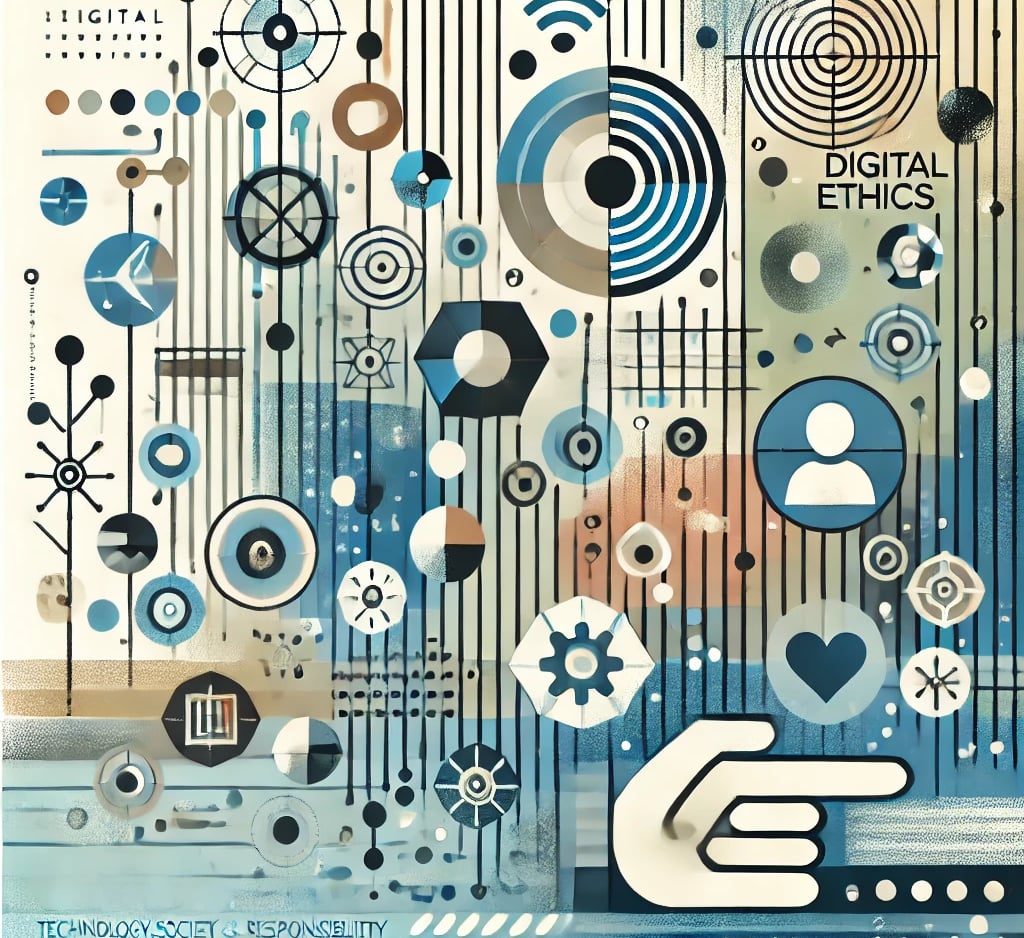Digital Ethics in Everyday Life: Technology, Society, and Responsibility
DIGITAL CULTURE AND PHILOSOPHY


Digital Ethics in Everyday Life: Technology, Society, and Responsibility
Technology permeates every aspect of our daily lives—from the smartphone we constantly carry to social networks where we share our thoughts—and raises important ethical questions. One of the most pressing issues is digital privacy. Every online action leaves a trace: Google searches, Instagram likes, geolocation histories. Many people increasingly wonder, “What happens to all this data? Who uses it, and for what purpose?” Recent surveys show that nearly 7 out of 10 adults are concerned about how governments and companies use the data collected about them. High‑profile cases such as the Cambridge Analytica scandal—where data from millions of Facebook profiles were used for targeted political advertising without consent—have highlighted the potential for abuse.
In response, regulations like Europe’s GDPR have emerged, introducing concepts such as informed consent and the right to be forgotten, while public debates continue on how to balance innovation (often driven by big data) with individual rights. For example, how many people actually read the terms of service before clicking “Accept”? Almost none—indeed, a survey found that 81% of Americans believe that the information collected by companies will be used in ways they would not approve of. This underlines the need for transparency: tech companies should clearly communicate what they do with our data, and users should have more control (being able to say, “Yes, use my data to improve the service, but not for resale to third parties”).
Another everyday issue is the impact of social media on society and mental health. Social networks have undoubtedly enhanced connectivity—we can keep in touch with distant friends and give voice to social movements—but they also have darker sides. Studies have found correlations between intensive social media use and increased anxiety and depression, especially among young people. Adolescents who spend hours comparing their lives to the idealized portrayals they see online may develop feelings of inadequacy or experience FOMO (“fear of missing out”). Additionally, the phenomenon of endless scrolling is real: a 2024 WHO report in Europe noted a significant increase in problematic social media use among teenagers, with potentially detrimental effects on sleep, study, and real‑life relationships.
On a civic level, technology poses challenges as well. Online misinformation and echo chambers mean that we often consume news filtered through a single perspective, reinforcing polarization. This has real‑world consequences—from the spread of fake news during the pandemic to election interference via orchestrated disinformation campaigns. It is incumbent on all of us to develop digital critical thinking—verifying the sources of a viral story before sharing it—and for platforms to adjust their algorithms so as not to reward only extreme or false content (which often generates more clicks).
There is also the issue of technology dependency. How often do we check our smartphones in a single day? Possibly too many times—a number that has become almost reflexive for many people. This constant engagement can impair attention spans and even affect family interactions—think of dinner scenes where everyone is absorbed in their own device. Terms like “digital detox” have entered common parlance, and some schools and companies are implementing “device‑free” periods to promote focus and well‑being.
From a responsibility standpoint, digital ethics requires a joint effort: tech companies must embed ethical principles into product design—minimizing manipulative practices like notifications engineered to foster dependency while maximizing privacy and inclusivity—while users must be conscious of their digital choices: using strong passwords, managing privacy consents, balancing online and offline time, and reporting abusive behavior (such as hate speech or cyberbullying).
An emerging concept is “ethical digital literacy”: just as there is civic or financial education, many advocate for incorporating digital ethics into school curricula. This includes understanding the impact of our online words (digital empathy), respecting intellectual property, and protecting one’s digital reputation.
In conclusion, technology is neither inherently good nor bad—it is an amplifier of human action. Digital ethics helps guide this powerful amplifier in the right direction. Every day, through small actions—from not spreading misinformation to thinking before posting something potentially offensive, or simply giving our full attention to those around us—we contribute to creating a healthier digital culture. The challenge is collective, as the line between the online and offline world grows ever thinner. It is up to all of us to ensure that fundamental human values—respect, truth, and fairness—continue to light the way through digital progress.
Bibliography:
Pew Research Center – “Americans and data privacy” (2023).
Pew Research Center – “Trust in AI and companies” (2023).
WHO Europe – “Teens, screens and mental health” (2024).
APA Monitor – “Teens social media & mental health” (2024).
AGCOM (IT) – “Educazione Civica Digitale” (2022).